Lord Byron Poetry: Darkness & The Duel & Stanzas
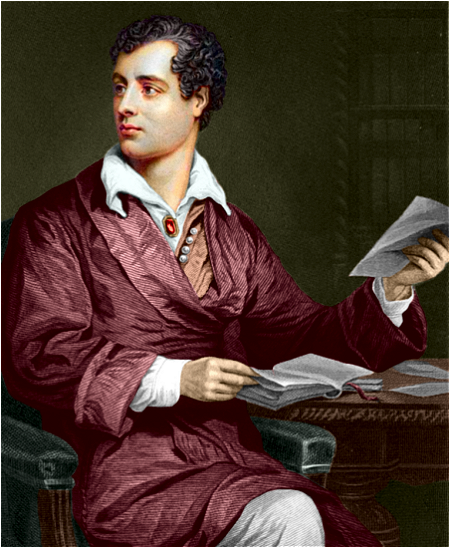
George Gordon Lord Byron
(London, 22 january 1788 – Mesolongi, 19 april 1824)
Darkness
I had a dream, which was not all a dream.
The bright sun was extinguished, and the stars
Did wander darkling in the eternal space,
Rayless, and pathless, and the icy Earth
Swung blind and blackening in the moonless air;
Morn came and went–and came, and brought no day,
And men forgot their passions in the dread
Of this their desolation; and all hearts
Were chilled into a selfish prayer for light:
And they did live by watchfires–and the thrones,
The palaces of crownéd kings–the huts,
The habitations of all things which dwell,
Were burnt for beacons; cities were consumed,
And men were gathered round their blazing homes
To look once more into each other’s face;
Happy were those who dwelt within the eye
Of the volcanos, and their mountain-torch:
A fearful hope was all the World contained;
Forests were set on fire–but hour by hour
They fell and faded–and the crackling trunks
Extinguished with a crash–and all was black.
The brows of men by the despairing light
Wore an unearthly aspect, as by fits
The flashes fell upon them; some lay down
And hid their eyes and wept; and some did rest
Their chins upon their clenchéd hands, and smiled;
And others hurried to and fro, and fed
Their funeral piles with fuel, and looked up
With mad disquietude on the dull sky,
The pall of a past World; and then again
With curses cast them down upon the dust,
And gnashed their teeth and howled: the wild birds shrieked,
And, terrified, did flutter on the ground,
And flap their useless wings; the wildest brutes
Came tame and tremulous; and vipers crawled
And twined themselves among the multitude,
Hissing, but stingless–they were slain for food:
And War, which for a moment was no more,
Did glut himself again:–a meal was bought
With blood, and each sate sullenly apart
Gorging himself in gloom: no Love was left;
All earth was but one thought–and that was Death,
Immediate and inglorious; and the pang
Of famine fed upon all entrails–men
Died, and their bones were tombless as their flesh;
The meagre by the meagre were devoured,
Even dogs assailed their masters, all save one,
And he was faithful to a corse, and kept
The birds and beasts and famished men at bay,
Till hunger clung them, or the dropping dead
Lured their lank jaws; himself sought out no food,
But with a piteous and perpetual moan,
And a quick desolate cry, licking the hand
Which answered not with a caress–he died.
The crowd was famished by degrees; but two
Of an enormous city did survive,
And they were enemies: they met beside
The dying embers of an altar-place
Where had been heaped a mass of holy things
For an unholy usage; they raked up,
And shivering scraped with their cold skeleton hands
The feeble ashes, and their feeble breath
Blew for a little life, and made a flame
Which was a mockery; then they lifted up
Their eyes as it grew lighter, and beheld
Each other’s aspects–saw, and shrieked, and died–
Even of their mutual hideousness they died,
Unknowing who he was upon whose brow
Famine had written Fiend. The World was void,
The populous and the powerful was a lump,
Seasonless, herbless, treeless, manless, lifeless–
A lump of death–a chaos of hard clay.
The rivers, lakes, and ocean all stood still,
And nothing stirred within their silent depths;
Ships sailorless lay rotting on the sea,
And their masts fell down piecemeal: as they dropped
They slept on the abyss without a surge–
The waves were dead; the tides were in their grave,
The Moon, their mistress, had expired before;
The winds were withered in the stagnant air,
And the clouds perished; Darkness had no need
Of aid from them–She was the Universe.
1816
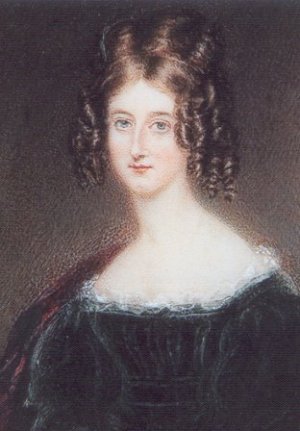
Stanzas to Augusta
I
Though the day of my Destiny’s over,
And the star of my Fate hath declined,
Thy soft heart refused to discover
The faults which so many could find;
Though thy Soul with my grief was acquainted,
It shrunk not to share it with me,
And the Love which my Spirit hath painted
It never hath found but in Thee.
II
Then when Nature around me is smiling,
The last smile which answers to mine,
I do not believe it beguiling,
Because it reminds me of thine;
And when winds are at war with the ocean,
As the breasts I believed in with me,
If their billows excite an emotion,
It is that they bear me from Thee.
III
Though the rock of my last Hope is shivered,
And its fragments are sunk in the wave,
Though I feel that my soul is delivered
To Pain–it shall not be its slave.
There is many a pang to pursue me:
They may crush, but they shall not contemn;
They may torture, but shall not subdue me;
‘Tis of Thee that I think–not of them.
IV
Though human, thou didst not deceive me,
Though woman, thou didst not forsake,
Though loved, thou forborest to grieve me,
Though slandered, thou never couldst shake;
Though trusted, thou didst not disclaim me,
Though parted, it was not to fly,
Though watchful, ’twas not to defame me,
Nor, mute, that the world might belie.
V
Yet I blame not the World, nor despise it,
Nor the war of the many with one;
If my Soul was not fitted to prize it,
‘Twas folly not sooner to shun:
And if dearly that error hath cost me,
And more than I once could foresee,
I have found that, whatever it lost me,
It could not deprive me of Thee.
VI
From the wreck of the past, which hath perished,
Thus much I at least may recall,
It hath taught me that what I most cherished
Deserved to be dearest of all:
In the Desert a fountain is springing,
In the wide waste there still is a tree,
And a bird in the solitude singing,
Which speaks to my spirit of Thee.
1816
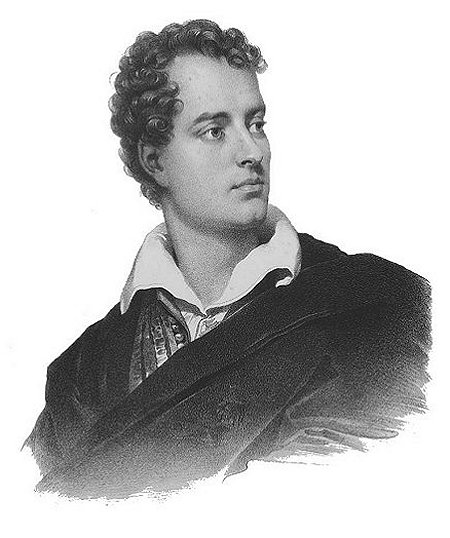
The Duel
1
‘Tis fifty years, and yet their fray
To us might seem but yesterday.
Tis fifty years, and three to boot,
Since, hand to hand, and foot to foot,
And heart to heart, and sword to sword,
One of our Ancestors was gored.
I’ve seen the sword that slew him; he,
The slain, stood in a like degree
To thee, as he, the Slayer, stood
(Oh had it been but other blood!)
In kin and Chieftainship to me.
Thus came the Heritage to thee.
2
To me the Lands of him who slew
Came through a line of yore renowned;
For I can boast a race as true
To Monarchs crowned, and some discrowned,
As ever Britain’s Annals knew:
For the first Conqueror gave us Ground,
And the last Conquered owned the line
Which was my mother’s, and is mine.
3
I loved thee–I will not say how,
Since things like these are best forgot:
Perhaps thou may’st imagine now
Who loved thee, and who loved thee not.
And thou wert wedded to another,
And I at last another wedded:
I am a father, thou a mother,
To Strangers vowed, with strangers bedded.
For land to land, even blood to blood–
Since leagued of yore our fathers were–
Our manors and our birthright stood;
And not unequal had I wooed,
If to have wooed thee I could dare.
But this I never dared–even yet
When naught is left but to forget.
I feel that I could only love:
To sue was never meant for me,
And least of all to sue to thee;
For many a bar, and many a feud,
Though never told, well understood
Rolled like a river wide between–
And then there was the Curse of blood,
Which even my Heart’s can not remove.
Alas! how many things have been!
Since we were friends; for I alone
Feel more for thee than can be shown.
4
How many things! I loved thee–thou
Loved’st me not: another was
The Idol of thy virgin vow,
And I was, what I am, Alas!
And what he is, and what thou art,
And what we were, is like the rest:
We must endure it as a test,
And old Ordeal of the Heart.

Stanzas
1
Could Love for ever
Run like a river,
And Time’s endeavour
Be tried in vain–
No other pleasure
With this could measure;
And like a treasure
We’d hug the chain.
But since our sighing
Ends not in dying,
And, formed for flying,
Love plumes his wing;
Then for this reason
Let’s love a season;
But let that season be only Spring.
2
When lovers parted
Feel broken-hearted,
And, all hopes thwarted,
Expect to die;
A few years older,
Ah! how much colder
They might behold her
For whom they sigh!
When linked together,
In every weather,
They pluck Love’s feather
From out his wing–
He’ll stay for ever,
But sadly shiver
Without his plumage, when past the Spring.
3
Like Chiefs of Faction,
His life is action–
A formal paction
That curbs his reign,
Obscures his glory,
Despot no more, he
Such territory
Quits with disdain.
Still, still advancing,
With banners glancing,
His power enhancing,
He must move on–
Repose but cloys him,
Retreat destroys him,
Love brooks not a degraded throne.
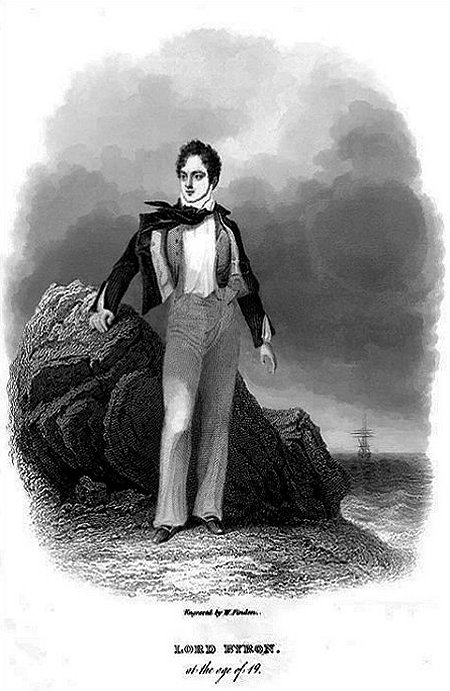
4
Wait not, fond lover!
Till years are over,
And then recover
As from a dream.
While each bewailing
The other’s failing.
With wrath and railing,
All hideous seem–
While first decreasing,
Yet not quite ceasing,
Wait not till teasing,
All passion blight:
If once diminished
Love’s reign is finished–
Then part in friendship,–and bid good-night.
5
So shall Affection
To recollection
The dear connection
Bring back with joy:
You had not waited
Till, tired or hated,
Your passions sated
Began to cloy.
Your last embraces
Leave no cold traces–
The same fond faces
As through the past:
And eyes, the mirrors
Of your sweet errors,
Reflect but rapture–not least though last.
6
True, separations
Ask more than patience;
What desperations
From such have risen!
But yet remaining,
What is’t but chaining
Hearts which, once waning,
Beat ‘gainst their prison?
Time can but cloy love,
And use destroy love:
The wingéd boy, Love,
Is but for boys–
You’ll find it torture
Though sharper, shorter,
To wean, and not wear out your joys.
1819
Lord Byron: Darkness & The Duel & Stanzas
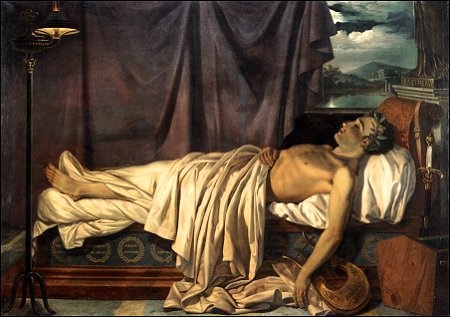
kemp=mag poetry magazine
magazine for art & literature
More in: Byron, Lord

